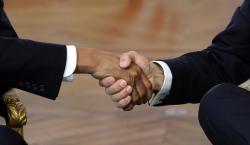

From the New Atlanticist: President Barack Obama took office in late January 2009, and there can be little doubt that he remains highly popular in Europe a year on. But it is also hard to escape the conclusion that despite the best of intentions on both sides of the Atlantic, there is dissatisfaction with the state of transatlantic relations. One hears criticism from Europeans about a U.S. lack of attention, about engaging with Russia more than with America’s own allies, especially in Central Europe, about under-valuing the European Union and about waiting for the Obama Administration to make up its mind on Afghanistan.
Equally, one hears American frustrations that despite President Obama’s investment of time and energy, including several trips to Europe, there has yet to be any substantial increased European investment in joining with the United States to meet global challenges, starting with NATO’s top priority, the war in Afghanistan. For many Americans, working with Europe is seen as process-oriented and time-consuming, without delivering real results…
• Revitalise NATO: Just as a strong European Union is a core American interest, a strong NATO must be seen as a core EU interest. Today there is talk of “three NATOs” – one focused on expeditionary roles, one focused on passive territorial defence against existential threats, and one focused on more actively engaging and defending Europe’s east. As NATO prepares its new Strategic Concept, these need to merge into a single vision that unites the transatlantic community. To do so requires a true political deal in which the U.S. and Europe face security challenges equally, no matter where they emerge, with America remaining a committed European power and Europe becoming an equal partner with the United States in tackling global security threats. (photo: Getty)
Image: obama-sarkozy-handshake-closeup.warsawbiopic.jpg
